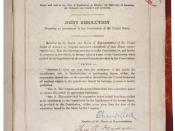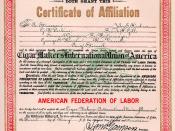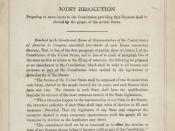The Progressive Era was a period of drastic reform in the United States. The 17th Amendment of 1913 reformed the direct election of Senators by putting the power of the vote in the hands of the people. The 18th Amendment of 1919 placed the prohibition of liquor because of the social and political temperance movements advocating this government regulation. The 19th Amendment of 1920 finally granted women's suffrage by giving women the right to vote in government elections. All three of these amendments reformed problems that Progressives called for after the nationwide depression from 1893 to 1897.
The 17th Amendment of 1913 took power of electing the senators of a state from the state legislature and placed it in the hands of the people of state. Many city and state governments were controlled by dishonest business executives and politicians who tried to block economic reforms and with a direct primary election, the command of elections would be in complete control of the citizens.
In 1904, Wisconsin had implemented the direct primary election and by 1916, all but three states had this system allowing the Seventeenth Amendment to be ratified. With the ratification of the Seventeenth Amendment, power has shifted decisively toward the federal government. The vitally important check the Senate provided against the House no longer exists, and the states are no longer represented in the national government. As a result, the federal government has imposed oppressive burdens on both the states and the people. Rather than checking each other, the House and Senate often act together; as "one current" they assume greater and greater control over the lives of the American people. The 17th Amendment has also radically politicized the nomination and confirmation of federal justices.
The 18th Amendment of 1919 is the prohibition amendment, which forbade people to...


